 This article commentates the parliamentary 'debate' on 14 August 2012 on this bill, including how these politicians avoid confronting the driver of overpopulation. We also cite speakers on the associated ills: "[T]he government is setting us up for privatisation of the permit system. That is the holy grail. [...]What we have here in Victoria is the product of a mad scientist experiment, turning a simple matter — something that is simple in cities around the world, planning and building codes — into a privatised, almost anything goes objective-based system that is fundamentally broken. We think this approach is fundamentally wrong. There is a simple and easy process for the minister to achieve the same objective within the existing provisions of the Planning and Environment Act 1987." (Greg Barber, Greens)
This article commentates the parliamentary 'debate' on 14 August 2012 on this bill, including how these politicians avoid confronting the driver of overpopulation. We also cite speakers on the associated ills: "[T]he government is setting us up for privatisation of the permit system. That is the holy grail. [...]What we have here in Victoria is the product of a mad scientist experiment, turning a simple matter — something that is simple in cities around the world, planning and building codes — into a privatised, almost anything goes objective-based system that is fundamentally broken. We think this approach is fundamentally wrong. There is a simple and easy process for the minister to achieve the same objective within the existing provisions of the Planning and Environment Act 1987." (Greg Barber, Greens)

Ed. All emphases, headings, and links are by candobetter.net editors. Source of quotations is at the end of the article.
Introduction
At the end of this article there is advice on how to tackle this problem. Scroll down for an overview, via headings, of what the MPs, Greg Barber, Mr Tee, and Mathew Guy had to say in Parliament.
The article starts with Greg Barber's speech because it sums up the problems with the bill, although Barber actually spoke after Mr Guy (Minister for Planning) and Mr Brian Tee, ALP State shadow minister for Planning and Sustainable Growth, which you can read at the end of Mr Barber's words.
Although Mr Barber's speech cuts through the detail, and although he talks about the Greens policies for planning, no more than Mr Tee or Mr Guy, does he address the cause of the proposed legislation which threatens to further erode Victorians' rights and turn our city and suburbs into an expensive concrete hell. The cause is the continued inviting of too many immigrants, at the behest of the growth lobby. In fact, Mr Barber attacked Kelvin Thomson not so long ago for trying to represent Australians on this issue that dwarfs all others. (See, "Are the Greens a real alternative?") As long as Mr Barber, Mr Tee and Mr Guy say nothing about the government's open invitation and offers to sponsor immigrants to Victoria on their "Live in Victoria" site, they cannot pretend that they are not aiding and abetting the death of democracy in Victoria, for all their fine words.

Barber: Elected councillors will lose their powers; Residents lose local representation
Mr BARBER (Greens)(Northern Metropolitan) on the Planning and Environment Amendment (VicSmart Planning Assessment) Bill 2012.
"It is clear that as we have gone from a Labor government to a Liberal government things have gone from bad to worse. When you look at the way planning currently works here in Victoria you can see that much of Mr Tee’s argument was hollow.
Of course we are seeking many outcomes from the planning system, and it seems that this bill will not provide them. In a simplified format this bill is attempting to set up a different track along which planning permits will be considered and decided upon. This new track will be that council officers will receive a planning permit application and, without necessarily the need for advertising or considering objections, go ahead and approve the application. Council officers will not be doing that under delegation from councillors; they will be doing it under a direct delegation from the council’s CEO, so a new system of deciding planning permit applications is being set up under this act.
That is pretty much all this bill does. It certainly does not tell us which type of applications and of which nature will be put into this stream. The minister has put the cart before the horse in introducing this bill to the Parliament. No-one has any idea, and there is certainly nothing in the legislation, that tells us what sorts of applications would be put into this stream. That is what allows Mr Tee to paint various scary scenarios.
The government says, "Trust us on the details" but how can we?
We would simply have to take it on trust from the government, because that issue will be determined later through the planning scheme, which of course the minister controls without reference to Parliament.
A fact sheet was produced by the minister, which says that ‘straightforward’ applications would be dealt with in this way.
The VicSmart — A Simpler Planning Permit Process fact sheet[Download here as pdf or here as word doc] is on the Department of Planning and Community Development website and states:
VicSmart will apply to straightforward, low impact applications. These applications will be clearly set out in planning schemes so applicants and the community know in advance how these applications will be handled. The types of minor permit applications being considered for VicSmart make up approximately 10 per cent of all permit applications.
We are then given a list of possible VicSmart applications, which includes: realigning a common boundary between two lots; subdividing existing buildings to create separate titles; building or extending a fence within 3 metres of a street; constructing a service station on land in an industrial zone; carrying out development and heritage overlay which is already exempt from public notice and review; managing vegetation in urban areas; building in the land subject to inundation overlay or special building overly; altering road access where the road is or will be in a road zone category 1; and erecting small advertising signs more than 30 metres from land in a residential zone where the sign is not lit, electronic or animated.
It makes you wonder: if it is really down to those simple issues, why has the government not approached this in a different way and established the same process through other mechanisms?
We know that the previous Labor government was constantly removing the requirements for permits and was constantly in the process removing residents’ rights to object.
It did so many times through the planning scheme, and if this minister found himself thwarted through legislation, he could certainly go ahead and, at the stroke of a pen, make many of these applications, through changes to the planning scheme, no longer subject to advertising and review.
It is not like that is a new idea.
In fact for the 11 years of the Labor government we had a capital city zone right here in the central part of the city of Melbourne.
Harks back to the Windsor Hotel and other ALP planning nightmares
There were many large applications, including the one involving Windsor Hotel, affecting thousands of residents. Every one of those applications — which were not for pergolas and fences; in fact one of them was for a massive development of a heritage-listed hotel, being the Windsor — was, and I will quote from the capital city zone planning scheme: … exempt from the notice requirements of section 52(1)(a), (b) and (d), the decision requirements of section 64(1), (2) and (3) and the review rights of section 82(1) of the act. That is a common enough provision in a range of zones and overlays and other schedules, but in relation to the capital city zone, if Mr Tee now really is as upset as he pretends to be about this removal of residents’ rights, why is it that over 11 years Labor never restored residents’ rights in the capital city zone? And why is it — and this is not a rhetorical question; I really want to know the answer — that only the Greens have committed to doing so? Why is it that during the entire process of the by-election for the Assembly seat of Melbourne, when we invited the Labor Party to endorse our policy, to give back rights to notice and appeal —
Victorians need rights in planning decisions; says Greens offered these at Melbourne By-Election
[...] But I would just say to opposition members that if you are not going to oppose Ted Baillieu’s policies and you have not got any policies of your own, could you at least endorse mine? And could you endorse here today, while we are on the subject of residents and neighbours — let us call them — having rights under planning decisions and in the capital city zone restoring to the 6500 voters who live in the CBD and in that zone the rights that you say this bill is taking away, which you say is a terrible thing, and you may be right.
Melbourne By-Election: ALP failed to put forward good planning alternatives
[...] But on the really big stuff Labor did not restore when it had the chance residents’ rights, and for that matter the rights of other types of neighbours in the city. Again, coming back to the Melbourne by-election, we invited Labor to endorse its policy, in fact the commitment the Labor Party made, to give live music venues some say over encroaching residential development. That is the so-called — and I am sure Mr O’Brien is going to get very excited about this — agent of change principle. The Labor Party committed to doing it but did not do it, and even during the Melbourne by-election where this was an important issue — we all remember seeing tens of thousands of people walking up Bourke Street in defence of live music — Labor declined the opportunity to endorse our commitment to what had been previously been its promise. That is a strange way to go about running an election.
Skyscrapers could go up next door to houses?
[...]the context is that you could be in the capital city zone and you could wake up one morning and find that you no longer have natural light because a 22-storey building has gone up next to you and you do not have — —
This is about Privatising the Permit System
[...]You never saw the yellow notice because you did not have a right to object — much less have your objection considered or have the opportunity to appeal a decision — so I think it is analogous, but members of the coalition government cannot see the contradiction. There is one more thing that is wrong with this bill, and that is that in setting up this second track the government is setting us up for privatisation of the permit system. That is the holy grail. Make no mistake: the reason this bill is here is because the development industry wants it to be here. They had been campaigning for it for as long as I have been involved in planning — 10 years, since I first became a councillor. This is the thing they have always asked for. Today we are arguing the merits of it, but they had been campaigning for it for 10 years to get to this point and now they have got it.
The Privatising of Planning Permits
What it ultimately allows for is the privatisation of planning permits in the same way that building permits, which used to be issued by councils and were sometimes even considered by councillors, were completely privatised.
Once you have taken this threshold step, which is that it is no longer a matter of the democratically elected local government of your area having control of the planning permit system because what councillors might say about it is now irrelevant and it is simply a statutory process being implemented by council officers under the head of power attached to the CEO, who got that from the act, not from a delegation of councillors, then what difference does it make?
Harks back to Mr Kennett's rule
Why not, as Mr Kennett did, send that whole process out to a competitive process and private assessors, because if these codes are as tight as Mr Guy seems to want us to believe they will be, they simply become mechanistic exercises in comparing an application to a code. Why not privatise them out? But that in itself is a contradiction, because as I said there are still two parallel tracks. Some small permit applications go through the traditional council permit, and some new types will go through the code assessment permit. It does not necessarily relate to the complexity or the codification — the codifiability, if you like — of these applications, because that is simply a matter of writing the rules.
We should be codifying more requirements of the planning scheme
The minister has the cart before the horse, and he has also taken a contradictory approach. We should absolutely be codifying more and more requirements of the planning scheme. It should be simple to know whether a particular type of development is possible or not. That would be good for developers and good for neighbours. What we have here in Victoria is the product of a mad scientist experiment, turning a simple matter — something that is simple in cities around the world, planning and building codes — into a privatised, almost anything goes objective-based system that is fundamentally broken. Labor kept it for 11½ years, barely tinkering with it, and now it makes lots of noises about the minister taking it the next step.
This Fundamentally wrong approach is also unnecessary
We think this approach is fundamentally wrong. There is a simple and easy process for the minister to achieve the same objective within the existing provisions of the Planning and Environment Act 1987."
Mr Guy argues for his party's new bill that Greens and ALP say is so awful
Mr Barber said quite a lot (which Candobetter.net editors have cut out) about the hypocrisy of the Labor opposition on planning, but Mr Guy also did, and extracts from his speech now follow.
Mr Guy protects the Growth Lobby by avoiding the population elephant in the room
Hon. M. J. GUY (Minister for Planning
"[...] What is worse? Is it the deprivation of home ownership or the expansion of an urban growth boundary? In my mind the deprivation of home ownership is far and away a prospect that is far worse and something that governments need to put their minds to addressing. In Melbourne our population is still growing very strongly and has been through the last few years to the extent where that growth of nearly 70 000 people per year is having huge impacts upon affordability, particularly when coupled with the previous Labor government’s land release policies. It is having massive impacts on affordability for people trying to get into the first home owner market."

CANDOBETTER Here Mr Guy is claiming that the objective of the new rules would be to help people buy affordable homes. He does not say that much of Victoria's real-estate and development goes to overseas buyers (who also easily obtain tax-payer-funded first home buyer subsidies) and that all this goes to raising the cost of home ownership as well as artificially keeping demand for houses up.
Note that no-one in parliament even touches on this!
Mr Guy continues by attacking the opposition. Of course the opposition has given him an enormous amount of ammunition, but this doesn't help Victorians:
MR GUY:
"[...] in 2010 the previous government expanded Melbourne’s urban growth boundary by 43 000 hectares, an area one-third of the size of Adelaide. No-one in the now Labor opposition, the then Labor government, opposed that 43 000-hectare expansion.
[...] It is absolutely, utterly unequivocal that if Labor had been re-elected in 2010, it would have pursued a strategy around logical inclusions. There was not a word of opposition from people on that committee such as Mr Tee, the now opposition planning spokesperson, who has been in hibernation for three months. The only written comments on the record that I have found from the Labor opposition in relation to logical inclusions — and this is not an unrelated issue — are from Labor’s deputy leader, James Merlino, the member for Monbulk in the Assembly, who has written to me. This correspondence is on the record and has been for some time. In this correspondence Mr Merlino sought a logical inclusion for the Waverley Golf Club [...]
In opposition Labor has no idea whether it supports the growth boundary expansion or opposes it. Labor’s shadow planning minister is out there opposing this policy, talking about the death of green wedges and his opposition to a policy that he supported just two years ago, yet Labor’s current deputy leader has written to me — and his correspondence is on the record — advocating on behalf of a golf club to get land included in the urban growth boundary as part of a logical inclusion[...]
Gutless parliamentarians under Brumby Government
[...] Those people who just two years ago did not have the guts to cross the floor and oppose their Premier, John Brumby, will now get up in this chamber and declare their opposition to outer urban growth when they expanded the outer urban growth area by 43 000 hectares. Let their hypocrisy be lost on no-one, because believe me it is not lost on the mainstream media or the population in those areas."
CANDOBETTER: It should not be forgotten that the Liberals, when in opposition, were just as gutless as the Labor parliamentarians about standing up to the developer dictatorship that Premier Brumby seemed to head up in Parliament. No-one stood up for Victorians then and it looks like no-one is standing up for us now.
MR TEE (ALP Shadow Minister for Planning and for "Sustainable Growth" [!])
Mr TEE (Eastern Metropolitan) — "I welcome the opportunity to speak on the Planning and Environment Amendment (VicSmart Planning Assessment) Bill
2012.
This legislation is frightening and is causing a great deal of concern in the Victorian community.
It provides a permit application, or a golden ticket, the holder of which can effectively bypass some of the most important planning provisions in the Victorian planning system.
If you hold a golden ticket and fall within the so-called VicSmart process, you do not have to talk to your neighbours or consult with the community to get your development up. You do not have to worry about the views of the local council or take into account, or indeed even notify, those who would be adversely affected by your application.
Best of all, if you have this golden ticket and you are part of the VicSmart system, the role of the Victorian Civil and Administrative Tribunal has been effectively gutted. Holders of this golden ticket get a direct free ride to VCAT, but the role that VCAT plays in protecting everybody else — the local community, the local council — is completely neutered by this bill.
Not just pergolas: "literally no constraints"
The government ministers say, ‘This is all good and well; we’re just looking at pergolas.’ But we all know that this legislation is much broader in its scope; the sky is the limit. There are literally no constraints on the powers provided under this bill in terms of heights and setbacks. There are no constraints at all; it is open slather. It could be that the first you would know that a decision has been made under these provisions to put up a multistorey development is when you come home from work and find that your neighbour’s house has been bulldozed.
Mr Tee's "livability" euphemism for the overpopulation elephant in the room
[...] People have a right to expect their communities to be protected. We also know Melbourne’s livability is what attracts the best and the brightest from around the world to live here, invest here and make their contribution to our economy and to the ideas that generate the wealth in this century. This is not only an attack on our livability; it is an attack on our economic success.
[...] clause 3 provides that paragraphs (b) to (e) of section 60(1) of the Planning and Environment Act 1987 will no longer apply. Section 60(1)(b) provides that when deciding on an application the responsible authority must consider the objects of planning in Victoria.
[...]
What are those objects? The first is: … to provide for the fair, orderly, economic and sustainable use, and development of land. That objective will not apply to a permit considered under the VicSmart provisions."
CANDOBETTER: Note that the above clause about 'fair, orderly, economic and sustainable use, and development of land' was used and abused repeatedly by VCAT members as an excuse to ignore environmental and democratic concerns. The economic principles are, unfortunately, whatever the prevailing government decides to say they are when they get into government. As Greg Barber says earlier in this article, we do need more encoding. Leaving these matters up to VCAT members who tend to be growth-lobby reared is like leaving baby chickens to the care of foxes.
Ecological principles that the Bill abrogates
MR TEE [continues]:
"The next object is:
… to provide for the protection of natural and man-made resources and the maintenance of ecological processes and genetic diversity. That will no longer apply."
CANDOBETTER: The 'economic' principles always trumped this with the ALP which had a derelict performance on protection of our natural environment within the planning process. (See "How thick can a political skin get...")
Built, social and ammenity environment
MR TEE [continues]:
"The next object is: … to secure a pleasant, efficient and safe working, living and recreational environment for all Victorians and visitors to Victoria. It will no longer apply. The next object is: … to conserve and enhance those buildings, areas or other places which are of scientific, aesthetic, architectural or historical interest, or otherwise of special cultural value. That will no longer apply. The next object is: … to protect public utilities and other assets and enable the orderly provision and co-ordination of public utilities and other facilities for the benefit of the community. That is another object that will no longer apply. The next object is: … to balance the present and future interest of all Victorians. That again will be gone."
CANDOBETTER: With regard to the protection of public utilities it is hard to see how the corporatisation and privatisation of resources undertaken by the former Labor government in Victoria can be held up as an example here, however, in this good cop, bad cop routine, where Labor Governments do bad things and then Liberal Governments do worse things, we can probably expect, as Mr Tee intimates, even more open slather.
Community and service providers lose rights to consultation
MR TEE [continues]:
"[...] It gets worse. The bill provides that section 60(1)(c) of the Planning and Environment Act will no longer apply to the consideration of a permit application under the VicSmart process. That section requires the decision-maker to consider objections and other submissions which have been received. That effectively means that the views of the community — that is, anybody has expressed a view about a development — are to be disregarded. They do not matter.
Another provision that is discarded by this bill is section 60(1)(d), which provides that the responsible authority must consider the decision and comments of a referral authority. The bill provides that the views of the power companies, VicRoads, WorkSafe and the water authorities are to be discarded. Their views are not to be considered when a permit application under these provisions is being considered.
Section 60(1)(e) also will no longer apply. That means that the decision-maker will not consider the environmental impact of the application. That section requires a decision-maker to consider the: … significant effects which the use or development may have on the environment or which … the environment may have on the use or development. Again, that provision will be gone, so there will be no requirement to consider the impact of the application on the environment.
Another issue relates to the role of local councils. The bill provides a role of local councils — that is, the role of the CEO of the local council will be to tick and flick any permit applications that come through the VicSmart process. The bill provides no role for the elected councillors — that is, those who are elected to protect their community and to make sure that the development that is undertaken is consistent with the look, feel and character of their community. All of that is discarded by this bill."
CANDOBETTER:Don't however get your hopes up that Mr Tee is some kind of hero, standing up for us all against the population growth that drives all this disenfranchisement, this destruction of our property and legal rights. Mr Tee, unfortunately, continues to barrack for high immigration.
MR TEE [continues]:
"We also know Melbourne’s livability is what attracts the best and the brightest from around the world to live here, invest here and make their contribution to our economy and to the ideas that generate the wealth in this century. This is not only an attack on our livability; it is an attack on our economic success."
CANDOBETTER:That is how he deals with the problem that he and everyone else in the parliament surely knows is causing the breakdown of Victorians' laws and rights.
What you can do
There is no point in just writing a protest letter to your local member of Parliament, but there is one effective kind of letter or email you can write to them. It is this: Write an email or a letter and send an electronic copy to http://candobetter.net to publish as a comment under this article or on our miscellaneous page. The email or letter to parliament should ask your parliamentarian what he or she is doing to prevent the continuing overpopulation of this city and state. Ask them what they have done to stop the government's permanent invitation to more and more immigrants via Live in Victoria.com.au? Ask what they have said in Parliament when the government was making laws to remove our rights to object to more development on the grounds that they were providing more opportunities for the homeless or to help affordabililty by releasing more land. Quote this article or provide the URL.
We will publish their answers and we will also record where they did not answer.
Send this article to people who may also want to stand up to this sham.
Representing Victorians on this issue better than we have been represented by the above debate is what you should be demanding of your politicians.
NOTES
Source:
PLANNING: SCHEME AMENDMENTS, Hansard, COUNCIL PROOF Tuesday, 14 August 2012
 Jack Roach of Boroondara Residents Action Group (BRAG) writes that neither our federal nor our state governments can fund the infrastructure required to supply a doubled Melbourne population. The growth lobby, which includes the Labor opposition, is placing pressure on Mathew Guy to reduce residents' rights. The real problem is, of course, the unwise decision to grow Melbourne's population.
Jack Roach of Boroondara Residents Action Group (BRAG) writes that neither our federal nor our state governments can fund the infrastructure required to supply a doubled Melbourne population. The growth lobby, which includes the Labor opposition, is placing pressure on Mathew Guy to reduce residents' rights. The real problem is, of course, the unwise decision to grow Melbourne's population.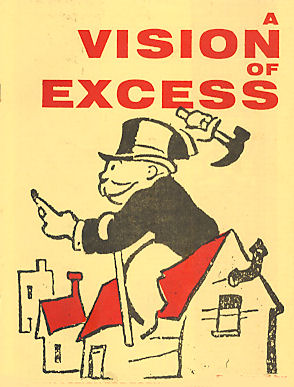 "Plan Melbourne" has been criticized by the planning expert, Professor
"Plan Melbourne" has been criticized by the planning expert, Professor




 Reading this letter to the Wheeler center about a shocking spin exercise delivered by professional development spruikers, with Roz Hansen (who is also involved in fielding public submissions), one is reminded of the film, We need to talk about Kevin, a film about a totally underestimated problem with utterly dire consequences. In fact, Melbourne really needs to talk about the corruption of democracy via Melbourne planning and development organisations, their contempt for citizens, their infiltration of law-making in parliament, and the gross unsustainability of the philosophy and projects they seek to unilaterally impose - Candobetter Ed.
Reading this letter to the Wheeler center about a shocking spin exercise delivered by professional development spruikers, with Roz Hansen (who is also involved in fielding public submissions), one is reminded of the film, We need to talk about Kevin, a film about a totally underestimated problem with utterly dire consequences. In fact, Melbourne really needs to talk about the corruption of democracy via Melbourne planning and development organisations, their contempt for citizens, their infiltration of law-making in parliament, and the gross unsustainability of the philosophy and projects they seek to unilaterally impose - Candobetter Ed.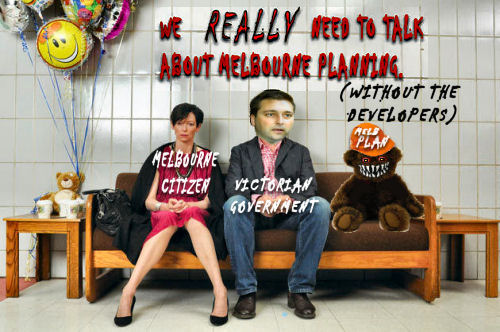 Letter to the Wheeler Center after “We Need to Talk” The Wheeler Centre Books Writing and Ideas – Series on “Ideas for Melbourne” Part 1 “The City of the Future” Wednesday 13 February 2013.
Letter to the Wheeler Center after “We Need to Talk” The Wheeler Centre Books Writing and Ideas – Series on “Ideas for Melbourne” Part 1 “The City of the Future” Wednesday 13 February 2013. The consideration of the Planning Zones Review should have been referred to the Parliamentary Committee for Environment and Planning which has considerable resources to put the 2,000 submissions on the Parliamentary website and then record on Hansard the hearings of some of the submitters before the Parliamentary Committee.
The consideration of the Planning Zones Review should have been referred to the Parliamentary Committee for Environment and Planning which has considerable resources to put the 2,000 submissions on the Parliamentary website and then record on Hansard the hearings of some of the submitters before the Parliamentary Committee.

 Community groups are making submissions on the Reformed Zones in Victoria. The government's zoning aims to increase commercial areas into residential areas in a serial manner and to intensify activity in the green wedges. The Department of Planning and Community Development has appointed a Ministerial Advisory Committee 'to review all submissions and provide advice back to the government', but the Chairman of the Committee is Geoff Underwood, who is prominent in the affairs of the Australian Population Institute (APop), which is officiated by professional developers and has the primary aim of promoting a huge population for Australia. What chances do robust submissions have with APop defining the parameters of planning in Victoria? See Planning Backlash submission inside.
Community groups are making submissions on the Reformed Zones in Victoria. The government's zoning aims to increase commercial areas into residential areas in a serial manner and to intensify activity in the green wedges. The Department of Planning and Community Development has appointed a Ministerial Advisory Committee 'to review all submissions and provide advice back to the government', but the Chairman of the Committee is Geoff Underwood, who is prominent in the affairs of the Australian Population Institute (APop), which is officiated by professional developers and has the primary aim of promoting a huge population for Australia. What chances do robust submissions have with APop defining the parameters of planning in Victoria? See Planning Backlash submission inside.
 The Government and opposition's population engineering continues to wreck havoc on democracy and land-tenure, affecting both private property and public lands, and impacting on established low-key local commerce. New proposed uses for the Green Wedge actually include saw-mills and display homes. The Flinders Community Association have begun issuing an information-packed alert for distribution to the local community detailing the damage that State Government changes to our Green Wedges can do to peoples' local natural, social and commercial environment, whilst removing their ability to defend what is theirs. Other communities may wish to take a similar democratic initiative before all our rights to self-government are swept away by unjust legislation to benefit developers. Note that these moves were begun by the previous Labor Government - which is hardly fighting them now. The incumbent government should be rolling back what Bracks and Brumby did, but instead, they are making things worse.MEETING IN FLINDERS COMMUNITY HALL 4 PM SATURDAY SEPTEMBER 15th 2012
The Government and opposition's population engineering continues to wreck havoc on democracy and land-tenure, affecting both private property and public lands, and impacting on established low-key local commerce. New proposed uses for the Green Wedge actually include saw-mills and display homes. The Flinders Community Association have begun issuing an information-packed alert for distribution to the local community detailing the damage that State Government changes to our Green Wedges can do to peoples' local natural, social and commercial environment, whilst removing their ability to defend what is theirs. Other communities may wish to take a similar democratic initiative before all our rights to self-government are swept away by unjust legislation to benefit developers. Note that these moves were begun by the previous Labor Government - which is hardly fighting them now. The incumbent government should be rolling back what Bracks and Brumby did, but instead, they are making things worse.MEETING IN FLINDERS COMMUNITY HALL 4 PM SATURDAY SEPTEMBER 15th 2012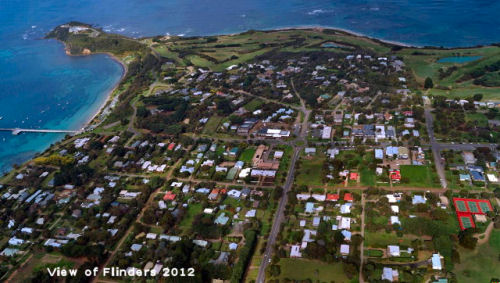
 The Green Wedges Coalition explains how Planning Minister Matthew Guy wants to turn 6000ha of Melbourne's green wedges over to development. The Liberal Government has a majority of one in parliament and this green wedges destruction is a foregone conclusion if the Libs all vote to support Matthew. CDB Editor says: Ask your government representative what he or she intends to do to prevent this abrogation of democracy and this insult to our natural environment and the wildlife it shelters. Let us know their answer. If you read this after the voting, then ask your MP what he voted for. You can look it up on Hansard too. Addition: The “Logical Inclusions” (6000 ha excised from the green wedges, taking habitat wetlands etc.) was passed by Parliament on 14/8. The new threat to Green Wedges – may be even worse as it affects the non-growth councils like MPSC as well as the growth councils – is the proposed changes to the zones which would allow a lot of urban uses into the Green Wedges.
The Green Wedges Coalition explains how Planning Minister Matthew Guy wants to turn 6000ha of Melbourne's green wedges over to development. The Liberal Government has a majority of one in parliament and this green wedges destruction is a foregone conclusion if the Libs all vote to support Matthew. CDB Editor says: Ask your government representative what he or she intends to do to prevent this abrogation of democracy and this insult to our natural environment and the wildlife it shelters. Let us know their answer. If you read this after the voting, then ask your MP what he voted for. You can look it up on Hansard too. Addition: The “Logical Inclusions” (6000 ha excised from the green wedges, taking habitat wetlands etc.) was passed by Parliament on 14/8. The new threat to Green Wedges – may be even worse as it affects the non-growth councils like MPSC as well as the growth councils – is the proposed changes to the zones which would allow a lot of urban uses into the Green Wedges.
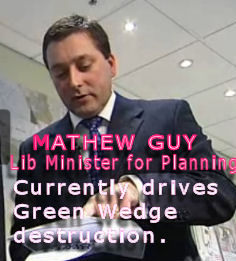
 "Any encroachment into our green spaces is irreversible. On the other hand, remaining faithful to the original intention of the green wedges, would give us all a more disciplined, sustainable, and welcoming city for the future." (Lady Hamer on 29 August 2012 as the Libs prepare to give bulldozers open slather on our green wedges, destroying wildlife and natural amenity.) Labor and the Liberals response is less than edifying and does not solve the problem. Basically both parties are in cahoots with the developers against the people of Melbourne.
"Any encroachment into our green spaces is irreversible. On the other hand, remaining faithful to the original intention of the green wedges, would give us all a more disciplined, sustainable, and welcoming city for the future." (Lady Hamer on 29 August 2012 as the Libs prepare to give bulldozers open slather on our green wedges, destroying wildlife and natural amenity.) Labor and the Liberals response is less than edifying and does not solve the problem. Basically both parties are in cahoots with the developers against the people of Melbourne.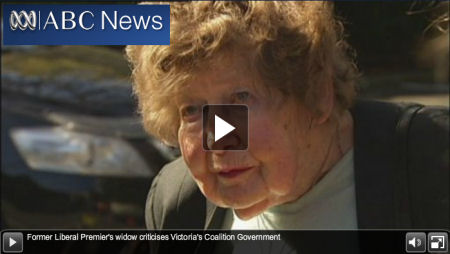

 This article commentates the parliamentary 'debate' on 14 August 2012 on this bill, including how these politicians avoid confronting the driver of overpopulation. We also cite speakers on the associated ills: "[T]he government is setting us up for privatisation of the permit system. That is the holy grail. [...]What we have here in Victoria is the product of a mad scientist experiment, turning a simple matter — something that is simple in cities around the world, planning and building codes — into a privatised, almost anything goes objective-based system that is fundamentally broken. We think this approach is fundamentally wrong. There is a simple and easy process for the minister to achieve the same objective within the existing provisions of the Planning and Environment Act 1987." (Greg Barber, Greens)
This article commentates the parliamentary 'debate' on 14 August 2012 on this bill, including how these politicians avoid confronting the driver of overpopulation. We also cite speakers on the associated ills: "[T]he government is setting us up for privatisation of the permit system. That is the holy grail. [...]What we have here in Victoria is the product of a mad scientist experiment, turning a simple matter — something that is simple in cities around the world, planning and building codes — into a privatised, almost anything goes objective-based system that is fundamentally broken. We think this approach is fundamentally wrong. There is a simple and easy process for the minister to achieve the same objective within the existing provisions of the Planning and Environment Act 1987." (Greg Barber, Greens)


 Federal Labor Member for Wills, Kelvin Thomson, has condemned reports in an article by Josh Gordon,
Federal Labor Member for Wills, Kelvin Thomson, has condemned reports in an article by Josh Gordon, 
Recent comments